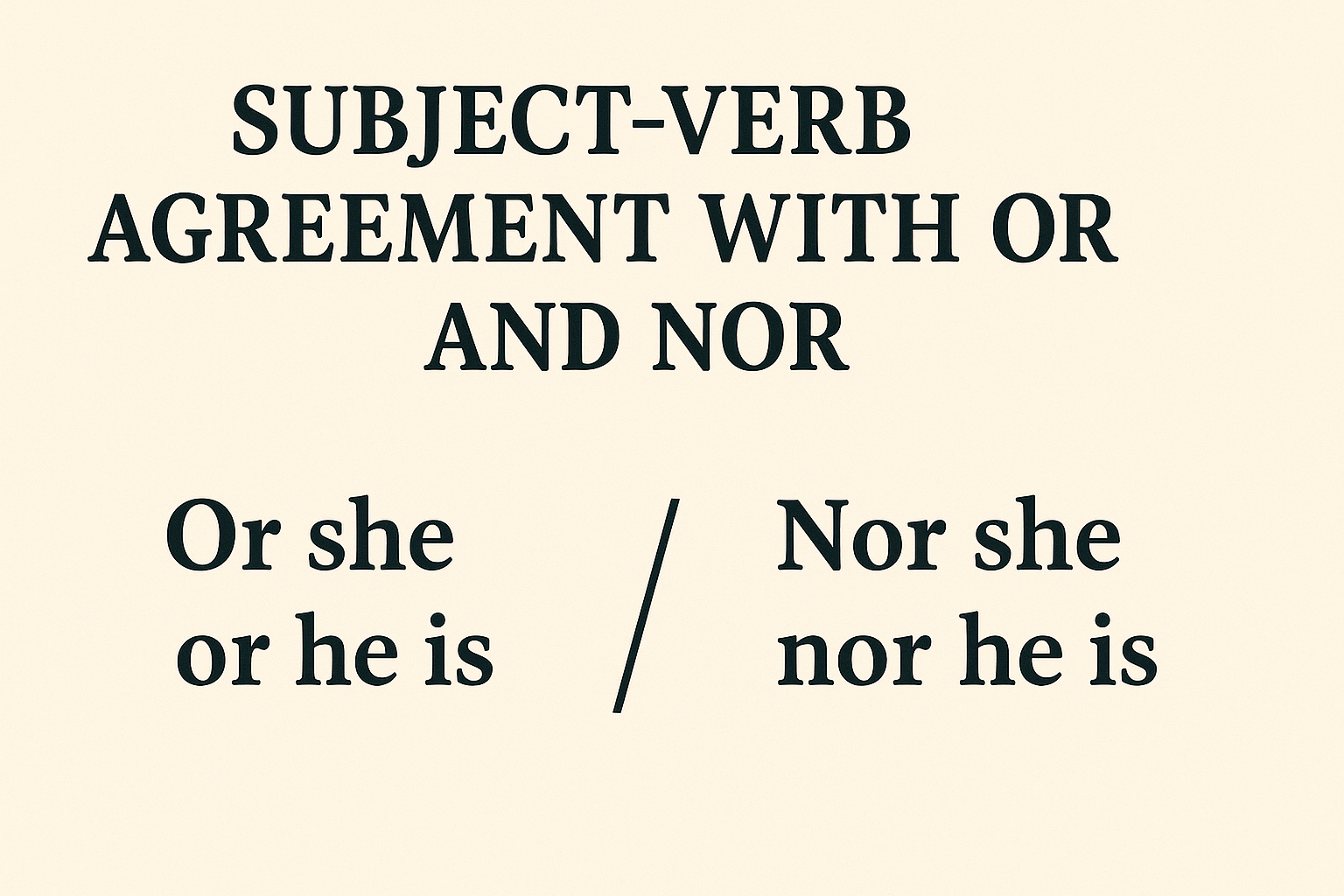Subject-Verb Agreement with Or and Nor-Grammar Puzzle Solved (38)
Subject-verb agreement can become confusing when two subjects are connected by words like “or” and “nor.” These joining words do not follow the same agreement pattern as “and.” Instead, English grammar follows what is called the proximity rule or closest subject rule.
This rule helps writers decide whether the verb should be singular or plural when the sentence contains two different subjects joined by “or” or “nor.” In this article, we will explain this rule in simple language, give many examples, and help you avoid common mistakes.

What Is the Rule?
When two subjects are joined by “or” or “nor,” the verb agrees with the subject that is closest to it.
This is also known as the rule of proximity.
Basic Structure
- Either + Singular Subject + or + Singular Subject → Singular Verb
- Either + Plural Subject + or + Plural Subject → Plural Verb
- Either + Plural Subject + or + Singular Subject → Verb agrees with nearest subject
✅ Correct Examples:
- Either the cat or the dog is hungry.
(“Dog” is closest to the verb and is singular, so we use “is”.) - Either the manager or the assistants are available.
(“Assistants” is plural and closer, so we use “are”.) - Neither my cousins nor my uncle is coming.
(“Uncle” is singular and closest to the verb, so we use “is”.) - Neither the director nor the employees are at fault.
(“Employees” is plural and nearest the verb, so use “are”.) - Either her brothers or her sister is at the door.
(“Sister” is singular and nearest, so the verb is “is”.)
❌ Incorrect Examples:
- ❌ Either the teacher or the students is in the room.
✔️ Correct: Either the teacher or the students are in the room. - ❌ Neither the boys nor the girl are playing.
✔️ Correct: Neither the boys nor the girl is playing.
Why Does This Happen?
The reason is that “or” and “nor” create an either/or situation. The subject of the verb is not both things at once; it’s one or the other. So, the verb only needs to agree with the subject nearest to it.
This pattern is different from when subjects are joined with “and”, which always makes the subject plural.
Example:
- John and Mary are here. (plural)
- Either John or Mary is here. (verb agrees with “Mary”)
More Examples in Sentences
- Neither the teacher nor the students are ready for the test.
- Either my friends or my brother is taking the car.
- Neither the twins nor their sister is home yet.
- Either the old books or the modern magazine is in the drawer.
- Either a banana or some oranges are in the basket.
- Either the actors or the director is responsible for the delay.
- Neither the flowers nor the vase is broken.
- Either the car or the bikes are being sold today.
Tips to Avoid Mistakes
- Always look at the noun nearest to the verb when using “or” or “nor.”
- Ignore the first subject until you check the second one.
- If the sentence sounds awkward, try rephrasing it to avoid confusion.
- If the subjects are both plural or both singular, agreement is easy.
- Example: Either the cats or the dogs are barking.
Common Confusions
Some learners mistakenly apply the rule for “and” to “or” and “nor.” Remember that:
- “And” combines both subjects → plural verb
- “Or” and “nor” offer a choice → verb matches the closer noun
Conclusion
Subject-verb agreement with “or” and “nor” becomes easy once you understand the proximity rule. Focus on the subject that is closest to the verb, and match the verb’s number (singular/plural) to that. Practicing these examples will help you apply this rule naturally in your writing and speaking.
This rule adds clarity and correctness to your grammar, especially in more complex or formal sentences. Keep practicing, and soon it will feel automatic.
Expressions of Time, Money, and Distance in Grammar: https://grammarpuzzlesolved.englishlitnotes.com/expressions-of-time-money-distance/
Anne Bradstreet: https://americanlit.englishlitnotes.com/anne-bradstreet/
D.H.Lawrence as a Modernist Writer:
https://englishlitnotes.com/2025/05/31/dh-lawrence-modernist-writer/
Letter to Uncle Thanking for Gift:
https://englishwithnaeemullahbutt.com/2025/04/26/letter-to-uncle-thanking-for-gift/
For grammar lessons, visit ChatGPT to explore the platform and interact with the AI: https://www.google.com
Discover more from Grammar Puzzle Solved by Naeem Ullah Butt
Subscribe to get the latest posts sent to your email.